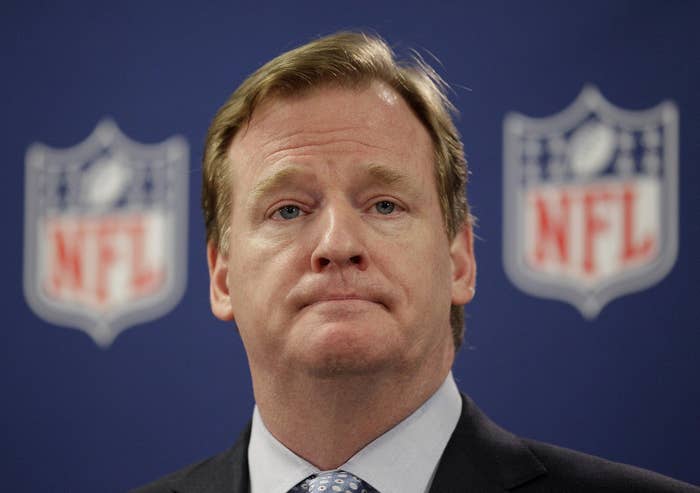
The NFL and Georgia's top sports teams suggest there could be economic repercussions for the state if Gov. Nathan Deal allows a religious freedom bill to become law.
But the top lawmaker in the state legislature, which passed the bill last week, condemned "inflammatory rhetoric" about the bill and suggested overblown opposition is based on a misunderstanding.
Gov. Deal's office has said the governor will decide in April whether to veto the measure, which has been criticized as a vehicle for LGBT discrimination.
If Deal fails to nix the bill, the NFL said, it would be a factor in deciding where to schedule the Super Bowl in 2019 or 2020.
"These policies would be one of many factors NFL owners may use to evaluate potential Super Bowl host sites."
"NFL policies emphasize tolerance and inclusiveness, and prohibit discrimination based on age, gender, race, religion, sexual orientation, or any other improper standard," Brian McCarthy, an NFL spokesman, said in a statement to BuzzFeed News when asked about the bill.
"Whether the laws and regulations of a state and local community are consistent with these policies would be one of many factors NFL owners may use to evaluate potential Super Bowl host sites," McCarthy added.
But House Speaker David Ralston, who backed the bill, implied critics didn't understand the legislation.
“The Speaker has been disappointed in some of the inflammatory rhetoric that has followed the passage of this bill," Kaleb McMichen, a spokesman for the Ralston told BuzzFeed News when asked about the the NFL's comments. "He is concerned some may be reacting without reading the legislation itself."
McMichen said the bill protects religious freedom "without opening the door to discrimination."
The bill wouldn't apply to businesses or commercial transactions, he said. "[Speaker Ralston] would encourage interested parties to take the necessary time to read the bill and understand its impact before rushing to judgment.”
Critics have argued House Bill 757 is designed to allow people and certain religious organizations to deny services to LGBT people, motivated by a backlash to the Supreme Court's marriage equality ruling last year.
It would protect certain religious groups — including those funded by the government — from being penalized if they decline to employ someone for religious reasons. It would also protect those organizations from government retaliation if they refuse charitable services on the basis of religion. Other parts of the bill would protect individuals exercising their faith.
Although the bill passed by wide margins in the state house and senate, The Atlanta Journal Constitution reports that the Atlanta Braves, Atlanta Falcons, and Atlanta Hawks — forming the city's trifecta of pro sports teams — issued blunt criticisms of the bill as it sits on the governor's desk.
The Braves said the team "believes that House Bill 757 is detrimental to our community and bad for Georgia. Our organization believes in an environment that is inclusive of all people."
Falcons owner Arthur Blank said: "I strongly believe a diverse, inclusive and welcoming Georgia is critical to our citizens and the millions of visitors coming to enjoy all that our great state has to offer. House Bill 757 undermines these principles and would have long-lasting negative impact on our state and the people of Georgia.”
Long considered hostile or ambivalent to LGBT rights, Fortune 500 companies and top sports franchises have increasingly become outspoken supporters. Explaining their opposition to discriminatory legislation across the country, the companies have argued LGBT-friendly laws are critical for businesses to remain competitive, saying they fear LGBT talent will avoid jurisdictions where discrimination is condoned by lawmakers.
But that corporate advocacy has created a fissure among conservatives. Corporations have been traditional constituents of pro-business Republicans, and the lawmakers are torn between those lobbies and socially conservative activists who push bills designed to minimize LGBT rights.
Still, sports brands have hardly been fundamentalists. When Houston voters repealed the city's nondiscrimination ordinance last fall, the NFL declined to withdraw the Super Bowl from the city, and the NCAA said it would still play scheduled games in the city. However, the NCAA also said said the city's vote "could impact the NCAA returning to Houston for a future Final Four."
The Human Rights Campaign, a national nonprofit that works closely with corporations on LGBT rights, announced the following groups also oppose the bill in Georgia: Apple, Dell, Dow Chemical Company, Georgia Chamber of Commerce, Hilton, Intel, Intercontinental Hotels, Live Nation Entertainment, Marriott, MailChimp, Metro Atlanta Chamber, Microsoft, Paypal, Salesforce, Square, Turner, Twitter, Unilever, Virgin, and Yelp.
Gov. Deal — who has been critical of the bill in the past — and House Speaker David Ralston did not reply to a request to comment on the NFL's statements.
